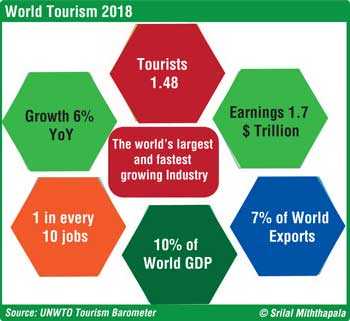Monday Feb 16, 2026
Monday Feb 16, 2026
Wednesday, 4 December 2019 00:00 - - {{hitsCtrl.values.hits}}


Recently there has been suggestions made by the new Government that tourism should be considered as an export industry and given the due status. The President of The Hotels’ Association of Sri Lanka Sanath Ukwatte has also welcomed this suggestion and says that the association looks forward to speedy implementation of this initiative. In this context it would be worthwhile to analyse this idea in more detail
The debate of export status
In the past there has been some debate on whether the tourism industry qualifies to be an export industry. This argument has been fuelled by the age-old definition of an export industry which is “an industry which exports goods and services produced and purchased by residents of another country”.
The problem stems from the wording “…purchased by residents of another country”. However, modern day interpretations take a different view. What is the harm if such goods and services, are purchased by ‘residents of another country’ in the same country of production, provided they pay for it in foreign currency?
Would this actually not be better for the economy in general? There would not be the burden of shipping costs, insurance and other overheads needed to ‘export’ such goods to foreign countries. This will result in such goods and services being able to be more competitive, and add greater value.
Because of this tourism has been labelled an ‘invisible export industry’.
The key factor in this argument is that the payment should be in foreign exchange.
Tourism clearly conforms to all these requirements. The goods and services are produced in one country, and ‘sold’ and consumed in the same country itself paid for in foreign currency
Hence today many countries already accept the fact that tourism is an export industry.

Recognition of tourism as an export industry
Tourism – an ‘infinite ‘export
What especially makes tourism a valuable export product is that, if cared for properly, it is a sustainable and renewable resource.
Unlike primary resources, such as petroleum or minerals, tourism is not finite. No matter how many people visit the ocean, the ocean is still the ocean, and no matter how many people view a mountain, the mountain remains in place. However the tourism product must not be protected.
Tourism, like any commodity, can be overused, exploited poorly or allowed to decline. Tourism also needs the support of the local community. Without this support, tourism often becomes an unsustainable product
The impact and depth of the tourism industry
The World Travel & Tourism Council (WTTC) President and CEO Gloria Guevara said: “Travel and tourism creates jobs, drives economic growth and helps build better societies. Governments around the world are realising the extraordinary benefits of tourism and I congratulate them for taking steps to maximise our sector’s potential.” 
For the seventh consecutive year, the travel and tourism sector has outperformed the global economy and in 2017 was the fastest growing broad economic sector globally, showing stronger growth than all sectors including manufacturing (4.2%), retail and wholesale (3.4%), agriculture, forestry and fisheries (2.6%) and financial services (2.5%).
In 2018, travel and tourism’s direct, indirect and induced impact accounted for:
With South Asia showing the largest growth tends it is said that the Asia pacific region will see the biggest economic impacts from the growth of the tourism industry. Due to its large trickle down and multiplier effects (see below) the tourism industry has even a greater positive impact on emerging economies such as Sri Lanka.
Tourism has a large multiplier effect
Tourism supports and nurtures a wide range of peripheral activates generating potential livelihoods to a wide cross section of the people in the informal sector.
It is estimated that in addition to tourism contribution in the South-Asian region from direct earnings to the GDP, there could be as much as an equal amount that comes from the informal sector. (Ref: Travel & Tourism Economic Impact 2018)
Tourism has a large trickledown effect
Tourism, unlike any other industry, has a large trickledown effect on the informal sector, generating many diverse job opportunities. Here again for every job in the formal (direct sector) there will be more than one job opportunity created in the informal (indirect sector)
Sri Lanka tourism and foreign exchange earnings
2017 ref CBSL Economic Research Department-06.04.2018

(In January 2018 tourism moved up to third place. Tourism earnings in January this year amounted to $ 458 million, up 12.7% year-on-year while garments grew 1.99% year-on-year to $ 434.8 million in the same period.)
Worker remittances are not something Sri Lanka should be proud of. “The pathetic side of these much-fancied export manufacture revenue earned through FDIs is told by migrant labour. Young women who slave for a pauper’s wage in the Middle East included, migrant labour remitted $ 7.1 billion the same year, that amounts to over 60% of the total revenue from all goods exported.” (http://www.dailymirror.lk/article/Coming-out-of-this-Fools-Paradise--156769.html)
All raw material and accessories for apparel manufacture is imported at around 18% of our total import expense (based on data from World Integrated Trade Solution). In 2017. This means from the $ 5 b earnings, about $ 3.9 b was imported raw material cost. Hence the real value added of textile and garments is in the order of $ 1 b only (http://www.dailymirror.lk/article/Coming-out-of-this-Fools-Paradise--156769.html)
In the case of the tourism industry in Sri Lanka it is estimated that about 90% of all foreign exchange earnings are based on value addition, with only marginal imports.
Hence on value added, ethical and moral basis, the tourism industry is the greatest foreign exchange earning industry in Sri Lanka.
There is no doubt that tourism is the pivotal and most crucial industry of Sri Lanka, not only from an economic aspect but also from a socio-economic perspective.
Hence there is the urgent need to elevate it to an export status industry to reap the statuary, regulatory and fiscal benefits and forge ahead to drive Sri Lanka’s economy forward.